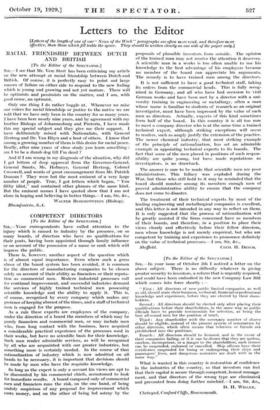COMPETENT DIRECTORS
[To the Editor of the SPECTATOR.] SIR,—Your correspondents have called attention to the injury which is caused to industry by the presence, on so many boards, of directors who have no qualifications for their posts, having been appointed through family influence or on account of the possession of a name or rank which will impress the public.
There is, however, another aspect of the question which is of almost equal importance. Even where such a gross abuse of the board system has been avoided, it is common for the directors of manufacturing companies to be chosen solely on account of their ability as financiers or their reputa- tion as commercial men. Modern industrial processes call for continual improvement, and successful industries demand the services of highly trained technical men possessing scientific knowledge and the ability to apply it. This is, of course, recognized by every company which makes any pretence of keeping abreast of the times, and a staff of technical men is engaged for the purpose.
As a. rule these experts are employees of the company, under the direction of a board the members of which may be purely financiers and commercial men, or may include men who, from long contact with the business, have acquired a considerable practical experience of the processes used in their works, but have no scientific basis for their knowledge. Such men render admirable services, as will be recognized by all who are acquainted with our greater industries, but something more is certainly needed. In the course of that rationalization of industry which is now admitted on all hands to be necessary, it is important that decisions should be made by men who have the requisite knowledge.
So long as the expert is only a servant his views are apt to be discounted by his commercial chiefs, accustomed to look for immediate results. A board composed only of commercial men and financiers runs the risk, on the one hand, of being unduly suspicious of any proposal for improvement which Costs money, and on the other of -being led astray by the proposals of plausible inventors from outside. The opinion of the trained man may not receive the attention it deserves. A scientific man in a works is too often unable to use his knowledge to the best advantage of his employers because no member of the board can appreciate his arguments. The remedy is to have trained men among the directors.
It is not sufficient to have a good technical staff, taking its orders from the commercial heads. This is fully recog- nized in Germany, and all who have had occasion to visit German works and have been met by a director with a uni-
versity training in engineering or metallurgy, often a man whose name is familiar to students of research as an original
investigator, must have been impressed by the value of such men as directors. Actually, experts of this kind sometimes form half of the board. In this country it is all too rare to meet a company director who is at the same time a trained technical expert, although striking exceptions will occur to readers, such as amply justify the extension of the practice.
The newer chemical industry, that most striking example of the principle of rationalization, has set an admirable example in appointing technical experts to its boards. The fact that some of the men placed in positions of such respon- sibility are quite young, but have made reputations as investigators, is no drawback.
The answer is sure to be made that scientific men are poor administrators. This fallacy was exploded during the War, but those who still hold to it may be reminded that the board should number among its members enough men of proved administrative ability to ensure that the company does not come to disaster.
The treatment of their technical experts by most of the leading engineering and metallurgical companies is excellent, and this letter is not intended in any way to reflect on them. It is only suggested that the process of rationalization will be greatly assisted if the firms concerned have as members of their boards, and therefore, in a position to place their views clearly and effectively before their fellow directors, men whose knowledge is not merely empirical, but who are competent by training and experience to pronounce definitely on the value of technical processes.—I am, Sir, &c.,






















































 Previous page
Previous page